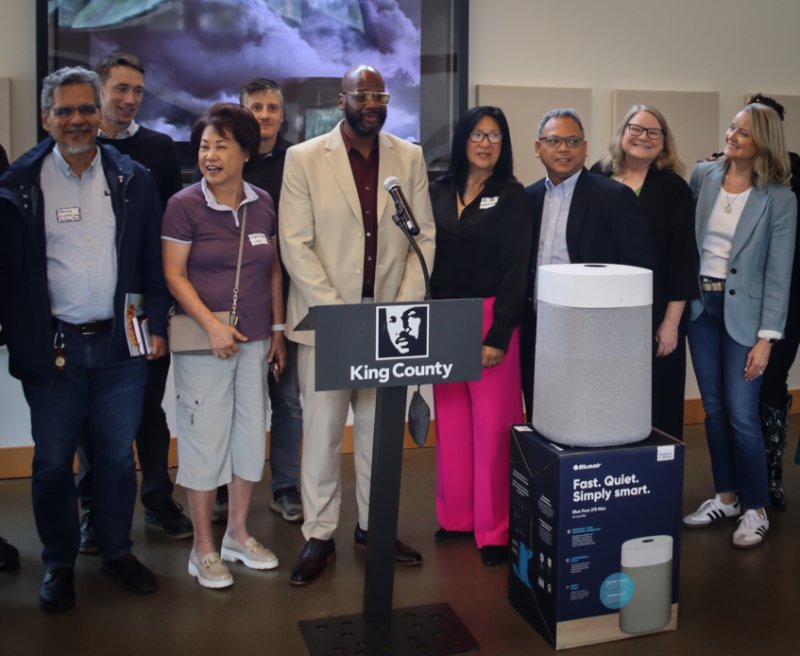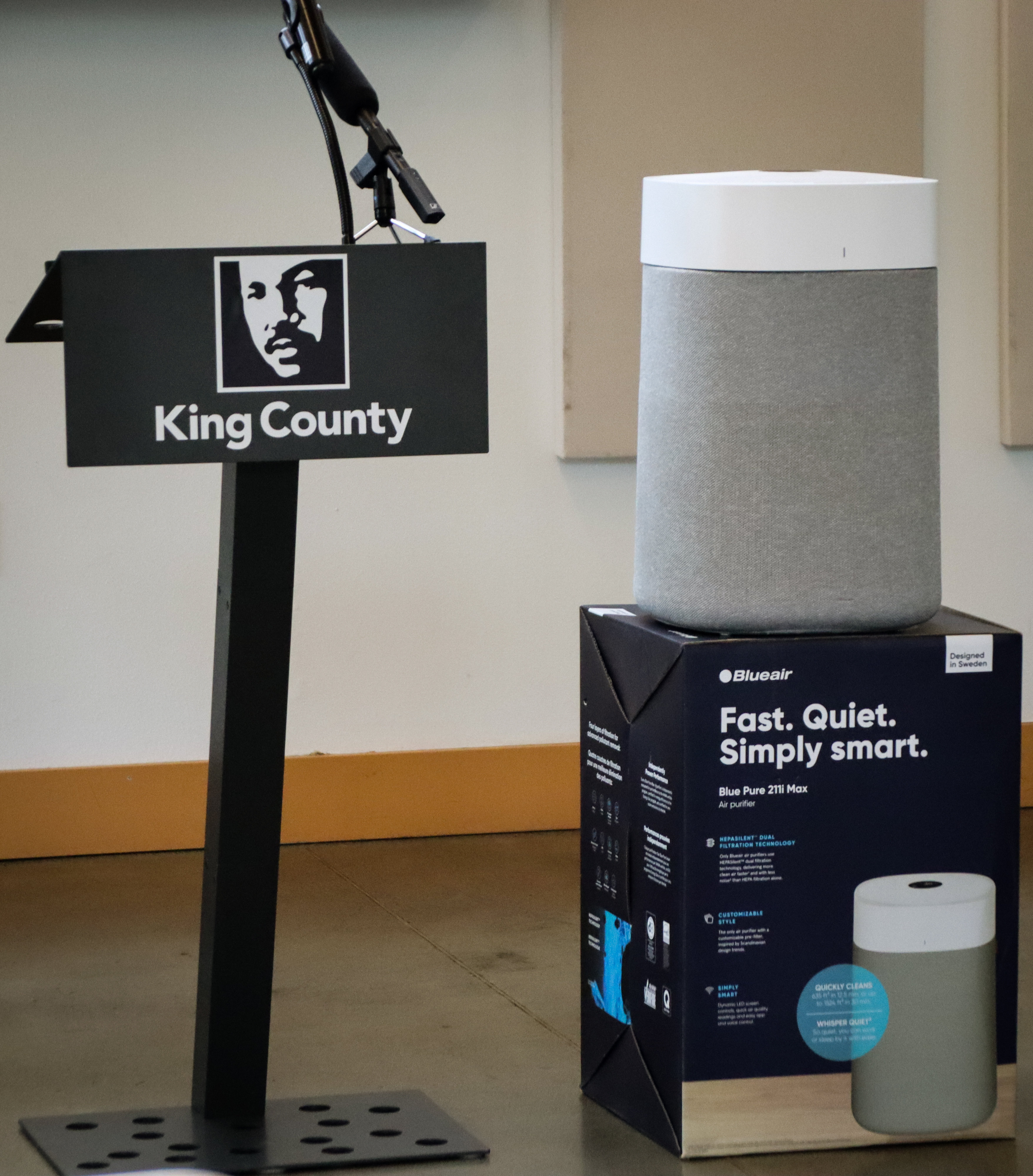
King County Executive Shannon Braddock (far right) and Ecology's Air Quality program manager Kathy Taylor (second from right) celebrate the air quality work done by community-based organizations.
Everyone in Washington deserves clean air, but history shows this hasn’t always been a priority. In South King County, hundreds of thousands of Washingtonians live within a corridor of manufacturing facilities, industrial development, and critical infrastructure that powers the economy of the Pacific Northwest. Decades of economic expansion have left a fingerprint of pollution on the lives of people who make their home in the region. When an opportunity arose to improve indoor air quality in this part of Washington, grant managers at Ecology jumped at the chance to grow their work beyond the usual focus on outdoor air quality.
“This funding opportunity was really unique for us because of the short timeline and large scope of work,” says Molly Williams, who manages Ecology’s air pollution reduction grants section. “The tight turnaround was the hardest part, but the potential benefit to the community from the air filters and forest restoration provided more than enough motivation.”
In the 2024 legislative session, Ecology received funds from the Climate Commitment Act set aside by the Washington Legislature to fund indoor air quality improvements in South King County. The funds, available beginning January 1, 2025, had to be awarded to organizations in South King County and spent in less than six months.
“Typically funding programs for air quality projects roll out over a span of years, not months, and focus on outdoor air quality,” says Williams. “With help from our partners at King County and 19 community organizations, we knocked this one out of the park and look forward to future opportunities to do this kind of work.”
Stretching dollars makes sense
Very rarely is $6 million seen as a small line item on a budget, especially when it comes to environmental work. Investments in indoor air quality, climate resilience, and forest restoration are expected to save money down the line with benefits not only for the environment, but also for public health.
“Thanks to great partnerships and funding from the Climate Commitment Act, in a remarkably short period of time, thousands of people can now breathe filtered air,” says Ecology Air Quality Program Manager Kathy Taylor. “Buildings have been made more resistant to the impacts of climate change, and acres of restored tree canopy will help to keep people cool and clean the air.”
The new air filters are already saving people money on health care. Tye Whitfield from Kingdom Gathering Outreach shared that one senior citizen told her: “I notice a dramatic difference. The air feels fresher, cleaner, and lighter. My allergy symptoms have reduced so much I hardly even take my medicine…I even do a little exercising now.”
How many homes in South King County were touched by this grant program? Here's a breakdown of how much the grant accomplished:
- 5,956 HEPA air cleaners given out
- 10,000 replacement air filters given out
- 2,500 trees and shrubs planted, restoring 8 acres of urban forest
- 77 homes improved by weatherization, heat pump installation, and ventilation work
There were plenty of logistical challenges to overcome, especially given that the HEPA air purifiers are larger than most mini fridges.
Hauling nearly 6,000 HEPA air cleaners around King County was no small task for the Public Health – Seattle & King County warehouse crew.
“Coordinating the receipt, warehousing, and distribution of nearly 6,000 air purifiers and 10,000 replacement filters was a significant logistical effort,” said Jeff Schelhase, distribution center warehouse supervisor for Public Health – Seattle & King County. “Our team worked to ensure timely and efficient deliveries to community-based organizations across King County. It was an honor to support this critical initiative, which plays a vital role in protecting public health and advancing environmental equity.”
Why South King County?
When you factor in the historical perspective of how the land was developed, who was historically allowed to buy real estate, and which voices were excluded, you begin to see why Ecology, under the Climate Commitment Act, has identified this part of Washington as one of 16 overburdened communities highly impacted by air pollution. Some community-based organizations have already begun work to improve air quality under a targeted Ecology grant program. However, this was an opportunity to tag in Ecology’s partners in county government and use their unique warehousing and distribution resources in concert with the King County Executive Climate Office.
“As our summers get hotter, our indoor air quality becomes even more important because we're experiencing the impacts of climate change. Things like more wildfire smoke,” says King County Executive Shannon Braddock. “And it's especially true for people who live near airports. And this project has really been focused on investing in those communities.”
Terrance Mayers, who manages the Indoor Air Quality Program at Public Health – Seattle & King County, says this effort isn’t a cure all. “These machines help mitigate, but we know that no matter what we do, there’s going to be pollutants in the air, in our homes, in our walls. Wildfire smoke season is upon us,” he says. Mayers sums up the effort with a call out to elected officials, “You will be hearing from us that we do need to continue this work. We have 19 community-based organizations that represented this program and they will all be in contact. So, advocacy and education are key. We can provide a resource. But if we can't educate to change minds or to change habits, then we're stuck in the same situation.”


